George Mason University has made significant gains in research funding over the past year, buoyed by programs in social sciences and computer and information sciences that are ranked in the top 10 among public universities.
Total research funding for Mason in fiscal year 2019 was $186 million—up from $149 million in 2018 and 86th among all public universities. That puts Mason well ahead of its pace to meet its goal of $225 million by 2025.
The latest figures released last week by the National Science Foundation (NSF) show Mason’s national profile continues to rise through solid research funding in critical areas.
Leading the way were:
- Social Sciences, which ranked 9th among all universities nationally, 7th among public universities and No. 1 in Virginia.
- Computer and Information Sciences, which ranked 12th among all universities, 8th among public institutions and No. 1 in Virginia.
- Engineering, which Mason entered the top 100 nationally, now at No. 93, jumping 49 spots from 142 in 2018, 69th among public universities.
Some of the long-term projects funded in FY 2019 that have helped position Mason as a leader in several fields include the following:
- Mason was awarded $15 million from the National Institute on Drug Abuse to establish a Justice Community Opioid Innovation Network (JCOIN) Coordinating and Translation Center. Part of the NIH’s Helping to End Addiction Long-term (HEAL) Initiative, which aims to speed scientific solutions to stem the national opioid public health crisis, the center draws on faculty from the Schar School of Policy and Government and College of Humanities and Social Sciences to manage logistics, engage with practitioners and other key stakeholders in the justice and behavioral health fields, and disseminate key findings.
- The Criminal Investigations and Network Analysis Center (CINA) is a multidisciplinary academic consortium led by Mason that pursues innovative strategies and solutions to advance criminal network analysis, forensics, and investigative processes. Faculty from a number of Mason schools and colleges were awarded grants in FY 2019 to support research into human trafficking hubs, digital forensics, money laundering and cryptocurrency, and geospatial analysis and transnational criminal organizations.
- Mason’s Program on Climate & Health—a program of Mason’s Center for Climate Change Communication—organized the Medical Society Consortium on Climate and Health. The consortium is informing the American public and policymakers about the health harms of climate change and air pollution from fossil fuels, which threaten everyone— especially children, the elderly, low-income communities and certain communities of color—and about the health benefits of climate solutions.
- The Rapid Prototyping Research Center in the Volgenau School of Engineering is developing highly reliable and versatile networking and communications technology for the Department of Defense. Among its capabilities, this new technology allows warfighters to transmit precise and secure position, navigation, and timing information on the battlefield when traditional satellite-based GPS and similar systems become degraded or unavailable. Such information is essential to coordinate battlefield assets and launch precision weapons.
- Volgenau’s Learning Agents Center is developing a novel decision-support system for the Department of Defense and intelligence community. Intelligence analysts are frequently presented with vast amounts of imprecise and uncertain data about crises around the world. The analysts develop recommendations for decision makers that guide U.S. military and diplomatic actions. Using artificial intelligence (AI) and other powerful technologies, this decision-support system helps analysts rapidly generate and evaluate many plausible recommendations.
- Today’s cyber defenses are largely static. Mason’s Center for Secure Information Systems has developed Adaptive Cyber Defense technologies for the Department of Defense. These technologies force adversaries to continually re-assess, re-engineer and re-launch their cyber attacks. Adversaries are presented with optimized and dynamically changing attack surfaces and system configurations, significantly increasing the attacker’s workloads and decreasing the likelihood of a successful attack.
“Volgenau School researchers have had extraordinary success in increasing research expenditures in FY2019, with engineering expenditures rising 129% to more than $36 million, and computing and information sciences expenditures rising 67% to more than $31 million,” said Kenneth Ball, dean of Mason’s Volgenau School of Engineering. “The opportunities created by this research funding for our students is phenomenal, reflecting the enormous value of being an R1 institution for our educational mission. Congratulations are due to all of our colleagues throughout Mason. This is a team effort and all Mason faculty, staff, and students have contributed to this success.”
“We are tremendously proud of the faculty research accomplishments that are recognized through Mason’s sustained ranking at #9 in the country in social science research,” said Ann Ardis, dean of Mason’s College of Humanities and Social Sciences. “I offer my congratulations to everyone who contributed to this national recognition.”
Overall the university moved up 11 spots to No. 122 in total research and development (R&D) for public and private universities in NSF’s 2019 Higher Education Research and Development (HERD) Survey.
The HERD survey is the primary source of information on R&D expenditures at U.S. universities and colleges, and collects information by field of research and source of funds. In FY2019, more than 900 universities responded to the survey.

